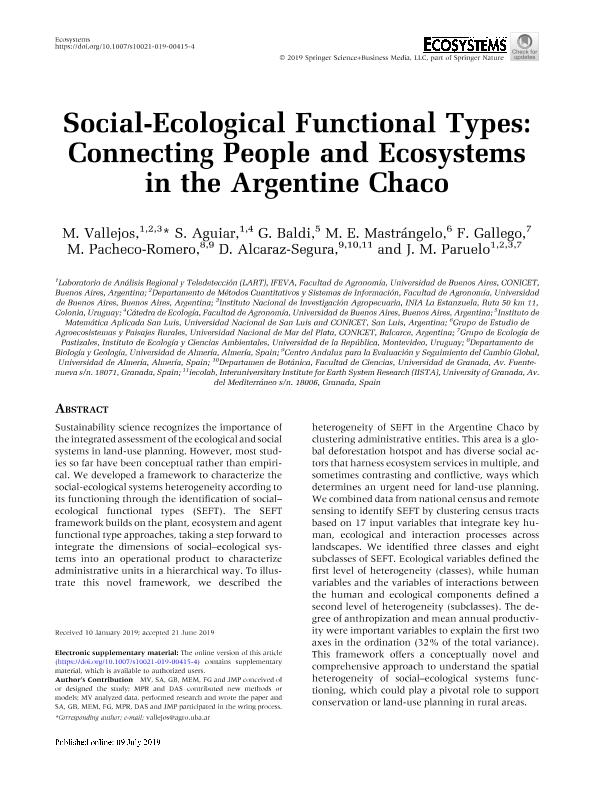Artículo
Social-Ecological Functional Types: Connecting People and Ecosystems in the Argentine Chaco
Vallejos, María ; Aguiar, Sebastián
; Aguiar, Sebastián ; Baldi, Germán
; Baldi, Germán ; Mastrangelo, Matias Enrique
; Mastrangelo, Matias Enrique ; Gallego, Federico; Pacheco Romero, Manuel; Alcaraz Segura, Domingo; Paruelo, José
; Gallego, Federico; Pacheco Romero, Manuel; Alcaraz Segura, Domingo; Paruelo, José
 ; Aguiar, Sebastián
; Aguiar, Sebastián ; Baldi, Germán
; Baldi, Germán ; Mastrangelo, Matias Enrique
; Mastrangelo, Matias Enrique ; Gallego, Federico; Pacheco Romero, Manuel; Alcaraz Segura, Domingo; Paruelo, José
; Gallego, Federico; Pacheco Romero, Manuel; Alcaraz Segura, Domingo; Paruelo, José
Fecha de publicación:
04/2019
Editorial:
Springer
Revista:
Ecosystems
ISSN:
1432-9840
Idioma:
Inglés
Tipo de recurso:
Artículo publicado
Clasificación temática:
Resumen
Sustainability science recognizes the importance of the integrated assessment of the ecological and social systems in land-use planning. However, most studies so far have been conceptual rather than empirical. We developed a framework to characterize the social-ecological systems heterogeneity according to its functioning through the identification of social–ecological functional types (SEFT). The SEFT framework builds on the plant, ecosystem and agent functional type approaches, taking a step forward to integrate the dimensions of social–ecological systems into an operational product to characterize administrative units in a hierarchical way. To illustrate this novel framework, we described the heterogeneity of SEFT in the Argentine Chaco by clustering administrative entities. This area is a global deforestation hotspot and has diverse social actors that harness ecosystem services in multiple, and sometimes contrasting and conflictive, ways which determines an urgent need for land-use planning. We combined data from national census and remote sensing to identify SEFT by clustering census tracts based on 17 input variables that integrate key human, ecological and interaction processes across landscapes. We identified three classes and eight subclasses of SEFT. Ecological variables defined the first level of heterogeneity (classes), while human variables and the variables of interactions between the human and ecological components defined a second level of heterogeneity (subclasses). The degree of anthropization and mean annual productivity were important variables to explain the first two axes in the ordination (32% of the total variance). This framework offers a conceptually novel and comprehensive approach to understand the spatial heterogeneity of social–ecological systems functioning, which could play a pivotal role to support conservation or land-use planning in rural areas.
Archivos asociados
Licencia
Identificadores
Colecciones
Articulos(IFEVA)
Articulos de INST.D/INV.FISIOLOGICAS Y ECO.VINCULADAS A L/AGRIC
Articulos de INST.D/INV.FISIOLOGICAS Y ECO.VINCULADAS A L/AGRIC
Articulos(IMASL)
Articulos de INST. DE MATEMATICA APLICADA DE SAN LUIS
Articulos de INST. DE MATEMATICA APLICADA DE SAN LUIS
Citación
Vallejos, María; Aguiar, Sebastián; Baldi, Germán; Mastrangelo, Matias Enrique; Gallego, Federico; et al.; Social-Ecological Functional Types: Connecting People and Ecosystems in the Argentine Chaco; Springer; Ecosystems; 23; 3; 4-2019; 471-484
Compartir
Altmétricas



